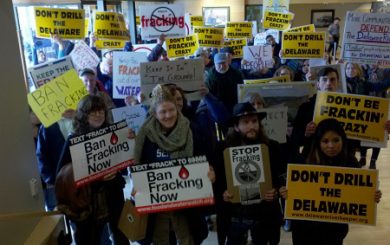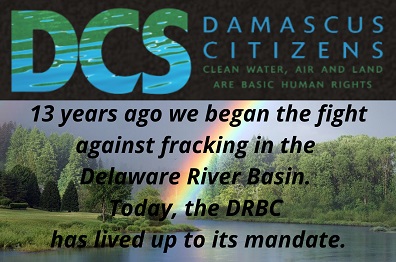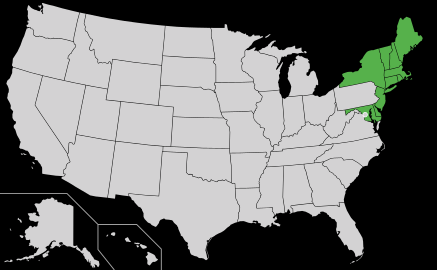
Historic Event? DRBC Could Determine the Fate of the Delaware River Watershed Feb. 25
February 19, 2021
Harmful Chemicals and Unknowns Haunt Pennsylvanians Surrounded by Fracking
March 2, 2021By Kathryne Rubright, Pocono Record, February 25, 2021
DCS, and many other organizations and individuals, have been fighting for over 13 years to keep fracking out of the Basin. Today our hard work and perseverance has paid off! Special thanks to DCS founding member Pat Carullo, who recognized the dangers of fracking way back in 2007 and identified the DRBC as the place to fight for a ban.
Download the DRBC Press Release as a pdf (includes links to the 2 resolutions passed).
Click here to view the DRBC meeting that voted for the ban.
Click here for the DRBC website.
Fracking has been banned on 13,539 square miles of land surrounding the Delaware River following a 4-0 vote Thursday by the Delaware River Basin Commission.
The ban is a long-sought win for environmental activists and a defeat to some landowners in the watershed who would have liked to profit from the natural gas below their properties.
Pennsylvania Department of Environmental Protection Secretary Patrick McDonnell, alternate for Gov. Tom Wolf, voted in favor of the new regulations, along with alternates for Gov. John Carney of Delaware, Gov. Phil Murphy of New Jersey and Gov. Andrew Cuomo of New York.
The federal representative, Brigadier General Thomas J. Tickner, commander and division engineer of the North Atlantic Division of the U.S. Army Corps of Engineers, abstained, citing the need for more time to coordinate with the new Biden administration.
Reading a statement from the governor, McDonnell said Wolf is “proud to join with other DRBC commissioners in preserving the water resources of this unique region for generations to come.”
By a 5-0 vote, the DRBC also approved a resolution to start a rulemaking process regarding the exportation of water for fracking elsewhere, and the importation of fracking wastewater, issues activists including the Delaware River Frack Ban Coalition has pushed to see addressed.
The watershed includes all or part of 17 Pennsylvania counties, seven of which sit entirely or partly over the Marcellus Shale that can be fractured by millions of gallons of water to extract natural gas: Carbon, Monroe, Lackawanna, Luzerne, Pike, Schuylkill and Wayne.
Officially, the DRBC had not imposed a moratorium on fracking, but in practice, the ban is a continuation of the past decade. The commission voted in 2010 to put off considering well pad dockets until regulations were adopted, and no fracking applications have been submitted since, “a situation that has sometimes been referred to as a ‘de facto moratorium,’” the DRBC said in an FAQ on the new regulations.
The vote was in line with the governors’ previously stated positions. Wolf, Carney and Murphy had expressed support for fully banning fracking in the Delaware River basin, and New York has already banned fracking.
“This is a watershed moment for protecting one of America’s most iconic watersheds. Fracking shouldn’t be allowed anywhere, much less near an iconic natural waterway like the Delaware River, which provides drinking water for so many,” said David Masur, executive director of the environmental advocacy group PennEnvironment in a statement issued after the vote.
“The data is conclusive: From cradle to grave, fracking puts the health of our planet and our communities at risk. By banning this toxic practice in such a vital and beloved watershed, regional leaders are taking strong action to protect millions of people,” Masur said.
In addition to protecting drinking water, the move protects a river that is vital to tourism, Halle Van der Gaag, senior manager for Pennsylvania and Delaware Programs for the National Parks Conservation Association.
“The number of visitors at parks along the Delaware River, notably at Delaware Water Gap National Recreation Area, has skyrocketed as the pandemic stretches on. More people are getting outside at our parks, and they deserve safe access and clean water,” Van der Gaag said in a statement, going on to highlight the economic impact.
“This river is more than a tourist destination; it’s the economic lifeblood for many surrounding communities and local businesses. In 2019, Delaware Water Gap and the Upper Delaware Scenic & Recreational River welcomed more than 3 million visitors, whose spending in the area generated nearly $130 million in economic activity. It is imperative that we protect our parks, our resources, and the people who love and depend on them from the devastating environmental impacts of fracking.”




